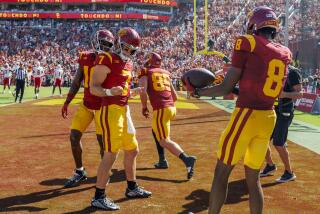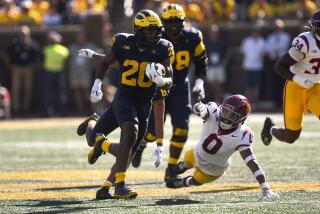They Both Run on a Winning Ticket : USC: Crayton plays the first half and McFadden has his best game in the second half as Trojans defeat the Sun Devils.
TEMPE, Ariz. — Sounding a little like a political candidate expounding on the economy, USC tailback Estrus Crayton was going on about the effectiveness of unrestricted competition in improving performance.
“He pushes me and I push him,” he said of fellow Trojan tailback Dwight McFadden. “He can only make me better. The system encourages competition, and that can only be good.”
It was a stump speech delivered in a towel- and tape-strewn hallway after USC defeated Arizona State, 23-13, Saturday. It was short on atmosphere but long on the themes of teamwork and sharing--the Trojan family values.
Crayton has no choice but to embrace USC Coach Larry Smith’s program for his running backs. It’s an agonizingly fair platoon system that has Crayton, a senior, start the game and play the first half, then sends freshman McFadden in to play the second.
Smith likes the system because it keeps both backs healthy and their legs fresh and allows McFadden to gain experience without too much pressure.
Smith’s tailbacks hew to the party line, saying “whatever works” and “as long as we win,” but they long to play a full game. However, in this they don’t get a vote.
“I guess that’s the way it’s going to be,” Crayton said. “It’s making me tough mentally and a better all-around player. I want to play more, but we do well together, too.”
The teamwork of Crayton and McFadden produced a third-quarter touchdown (by McFadden) and a rare 100-plus yards for the rushing game. Crayton gained 45 yards in his first-half shift, and McFadden amassed a personal-best 95 yards in the second half. It was the third consecutive game that the second-year freshman was USC’s leading ground gainer.
“This is what we expect of Dwight,” said Wayne Nunnely, coach of USC’s running backs. “This system allows us to get the best out of both our backs. It’s a 1-2 punch. Estrus has the experience, and Dwight just needs time to learn to block and do some of the other things we expect of a back. It’s going to happen.”
McFadden was impressive in his 30 minutes. He scored his first touchdown as a collegian on the Trojans’ 98-yard drive during the third quarter, carrying the ball six times on the 11-play march. His touchdown came when he dived for the corner of the end zone to end a five-yard run.
The performance is all the more impressive in light of McFadden’s recent off-field distractions, brought on after his arrest on Oct. 19 for allegedly brandishing a weapon. According to police, McFadden waved an unloaded BB gun at a panhandler.
McFadden declined to speak to reporters after Saturday night’s game.
His emergence has helped turn around an alarming trend at Tailback U. The Trojan rushing game has hovered at the bottom of the Pacific 10 Conference this season, much to the shame of USC’s offensive line.
“We didn’t like that at all,” right tackle Tony Boselli said. “We took it very personally. We decided we would have to step it up, and we did.”
The effort of USC’s offensive line and its backfield against Arizona State combined to narrow the margin between the team’s passing and rushing yardage. The Trojans gained 137 yards in the air and 115 on the ground against the Sun Devils, the kind of parity that better suits USC’s attack.
Smith took note and suggested that, while he believes in the platoon system, he’s not married to it.
“We’ll continue to use it as long as it’s effective,” Smith said. “I like the fact that Dwight is getting the experience. I know both players want to play the entire game. I want them to be competitive, and I expect them to want to play the whole game. It could change. I don’t know.”
If it sounds as if Smith is waffling, he’s not. He’s still sold on the system of trickle-down tailbacks, but he has the courage to change.
More to Read
Go beyond the scoreboard
Get the latest on L.A.'s teams in the daily Sports Report newsletter.
You may occasionally receive promotional content from the Los Angeles Times.







